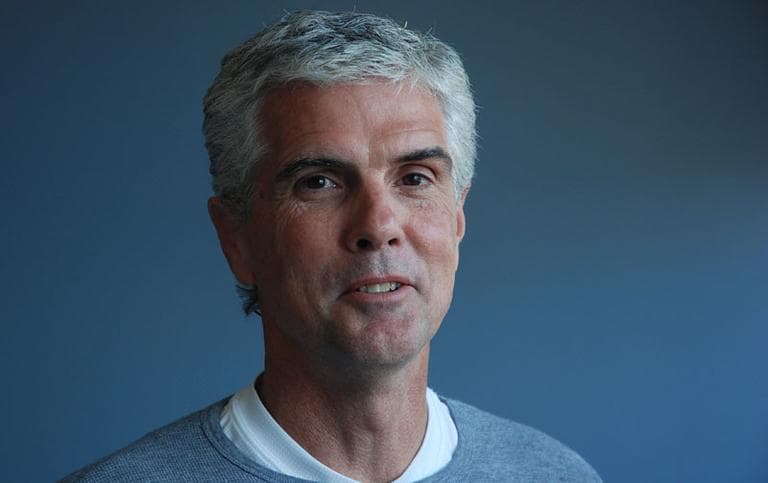Advertisement
What's Next In The Arab World?
Resume
It's looking like this will be another week of violent anti-American demonstrations triggered byt that film that mocked the Prophet Muhammad.
On Monday, there were shouts of "Death to America" in Kabul, Afghanistan and other protests in Pakistan and Jakarta. The protests started in Cairo last Tuesday and then spread to Libya where the U.S. ambassador and three other Americans were killed in an attack on the embassy in Benghazi.
We look at where this is headed and how it will affect the U.S. relationship with the Arab world with Jeffrey Fleishman, Cairo Bureau Chief for the Los Angeles Times.
Book Excerpt: 'Shadow Man'
By: Jeffrey Fleishman
Chapter 1
 I remember him coming home from shipyards and factories, boots clicking and thumping down the sidewalk, and him whistling and smoking a rolled cigarette, metal flakes in his hair, hands stained and chipped as if he were wandering in from a war. Then into the kitchen for a gulp of beer; if it was summer, he’d step onto the back stoop and stare over rooftops of antennas to the gathering moon. The sky soothed him. Twilight was his time, not that he ever told me to stay away, it’s just that sometimes you know when not to crowd a man. I watched him through the screen, setting my breaths to his and staying invisible, like a spy or a saint or a moth in the shadows.
I remember him coming home from shipyards and factories, boots clicking and thumping down the sidewalk, and him whistling and smoking a rolled cigarette, metal flakes in his hair, hands stained and chipped as if he were wandering in from a war. Then into the kitchen for a gulp of beer; if it was summer, he’d step onto the back stoop and stare over rooftops of antennas to the gathering moon. The sky soothed him. Twilight was his time, not that he ever told me to stay away, it’s just that sometimes you know when not to crowd a man. I watched him through the screen, setting my breaths to his and staying invisible, like a spy or a saint or a moth in the shadows.I can’t even recall yesterday and here I am tracing the edges of decades ago — I think it’s been that long — in a Philly neighborhood of men standing on stoops and drinking Genny. They were statues, all of them, different shapes and sizes, yes, but statues all the same, with raised, cocked arms and tilted-back heads. Sips and slurps played into the night and crumpled cans clattered off the rims of garbage bins as women hurried suppers onto tables and boys like me crossed ourselves, bowed for grace, and counted our sins. What keeps drifting through me, though, like breeze off a sea, is that summer after Mom died, the same year Richard Nixon scowled sweaty and sinister and I started noticing newspaper headlines and halter tops. For some reason girls in halter tops stand out; bare shoulders and tanned backs moving in wondrous rhythms. It was the year my dad told me to call him Kurt.
* * * * * * * * * *
The summer I called my dad Kurt was also known to Kurt and me as the summer of Vera. She burst into our neighborhood diner on a Friday night, one of those people you hear coming before you see them, not like the cowboys in the movies who ride in from way off in the distance without making a sound. Vera jangled. She plucked a menu from the slot near the silver cash register and pulled it to her eyes and ran her fingers across each line as if she were reading Dostoevsky or a lawn mower manual, something you had to pay real close attention to. Everyone looked up quick, got a glance, and then stared down at the Formica tops, counting those little gold flecks, hoping, praying, this woman would pass them the way a storm skims in real close and then mysteriously whirls away. She spotted Kurt and me sitting by the window, minding our own business, trying to scrunch small, but you can’t get too small in a window seat, especially at night when the lights outside put you on a kind of stage. She headed right for us. Kurt said under his breath: “Shit.”
“You boys look lonely.”
“No, we’re pretty good,” Kurt said.
“Well, you look lonely to me. What are your names? Mine’s Vera, and I’m tired of driving. Exasperated, you might say. I saw this ragged-lit place from the road. You know Edward Hopper? This diner could have slipped off one of his canvases.” She held up a spoon, polished it with a napkin. “I need some tea. Tea with lemon. I prefer it that way, although I know the Brits drink it with milk, but I never did trust the Brits, not since my first boyfriend, he was a Brit, ran off with a good friend, at the time it seemed she was, anyway. Scooch over and let me in.”

Vera slid next to Kurt and kept chattering. Chatterers drove him insane, the same way unforced errors did. I was still trying to figure out Edward Hopper.
Vera’s face was fury and delight. Soft yet angular, it was hardened by eyeliner and lipstick; a face you could kiss and fight with in a single moment. I decided she was pretty, especially in profile. Her voice, despite its chattiness, was husky, bruised almost, a late-night-movie voice kind of like Lizabeth Scott’s, this old Hollywood actress with a slight lisp Kurt was in love with. Every Sunday when the Inquirer hit the doorstep, he’d grab the TV Guide and go through each day of the week hoping for a Lizabeth Scott movie. If he found one, a little hoot would echo through the house and he’d circle the time and channel, and if it wasn’t too late, maybe a little past midnight, he’d haul me to the TV to watch it with him. I was more into Wonder Woman, but there was something alluring about Lizabeth Scott, luminous in black and white, like she was part of an ancient story that would keep playing even after the TV went off and the glow on the screen shrank to the size of a dime before going dark.
Vera kept talking and Kurt kept sliding in the booth and Vera kept sliding after him, until Kurt was pretty much pressed against the window. “I’m glad I met you two fine gentlemen,” said Vera. “You live around here?”
“Up the street a ways. Not close, in fact it’s kinda far, now that I think about it. It’s pretty far, huh, Jim?”
“A good ways away.”
“Well, Kurt, here’s the deal. I need a place to stay. I’m in a little trouble.”
“What kind?”
“The kind a woman gets into and can’t easily get out of.”
“That could be a lot of things.”
“A man.”
“What kind of man?”
“The worst damn kind.”
“I don’t know, Vera. Me and the boy stay to ourselves.”
We were definitely in a Lizabeth Scott moment. Kurt knew it, too. It came over his face the way a mathematical equation suddenly makes sense to you. But Kurt was holding back, and Vera kept pressing. She ordered more tea and played with lemon slices like they were tiny suns setting in Kurt’s periphery. Kurt kept his eyes straight ahead, sometimes looking at me to help him out, and I kept trying to think of something, but deep down I didn’t mind if Vera came home with us. It had been a lonely house.
“This man,” said Kurt, “is he big?”
“Not especially. But he’s meaner than hell. He once shot two guys in the same day.”
Kurt moved in his seat.
“Man, Kurt, you’re easy. I’m teasing you. The guy’s not big, but he’s evil, sinister. Like a phantom.”
It was hard to know if she was telling the truth.
“I don’t want to know about it,” Kurt said.
“Best not to.”
Vera reached over and brushed the hair off my forehead with her fingers. It felt strange and nice, and she told me that I looked a little like Kurt, only handsomer, which made me smile, and I could see Kurt wanted to smile too, but he stayed quiet by the window, thinking. Vera hummed “(I Can’t Get No) Satisfaction” by the Rolling Stones and asked me if I wanted to dance, but I said no. I had never seen anyone dance in the diner, except when Billy Doyle played “Fly Me to the Moon” on the jukebox and danced with a bottle of Thunderbird and an imaginary girlfriend after he pitched a no-hitter in church-league softball. Vera hummed another tune and reached for Kurt’s hand; no woman had touched that hand since Mom died.
“I need help,” she said.
Copyright Steerforth Press.
Guest:
- Jeffrey Fleishman, Cairo Bureau Chief for the Los Angeles Times
This segment aired on September 17, 2012.